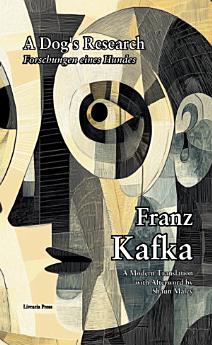A Dog's Research
The Complete Works of Franz Kafka বই 26 · Continental Press
ই-বুক
128
পৃষ্ঠা
family_home
উপযুক্ত
info
reportরেটিং ও রিভিউ যাচাই করা হয়নি আরও জানুন
এই ই-বুকের বিষয়ে
This has been translated as "Investigations of a Dog" or "Researches of a Dog" and other variations. The original German title was "Forschungen eines Hundes". In the narrative tradition of Voltaire in works such as "Micromégas" (1752), Kafka's story is narrated by a dog who reflects on his life and engages in an obsessive investigation of the mysterious forces governing his world, particularly focusing on the nature of sustenance and survival. The dog questions why food appears as if by magic and struggles to comprehend the rituals and behaviors of other dogs. His inquiries, however, are fraught with frustration, as he is unable to find satisfactory answers, leading to an ongoing sense of existential confusion. "A Dog's Research" can be read as a satirical and philosophical commentary on the limits of human understanding and the search for meaning, just like Voltaire's comedic-philosophic works. The dogs futile quest for knowledge mirrors the human condition, where ultimate truths often remain elusive despite relentless effort. The storys tone, blending humor with melancholy, underscores the tension between curiosity and the inherent limitations of perception. Kafkas use of the dog as a narrator allows him to examine human behaviors and social structures from an outsiders perspective, making this story a profound meditation on existence and the pursuit of knowledge.
লেখক সম্পর্কে
A Bohemian novelist and short-story writer, Kafka's work, which fuses elements of realism and the fantastic, typically features isolated protagonists facing bizarre or surrealistic predicaments and incomprehensible socio-bureaucratic powers. His writings, such as "The Metamorphosis" and "The Trial," explore themes of alienation, existential anxiety, and guilt, and are influential in modernist literature.
ই-বুকে রেটিং দিন
আপনার মতামত জানান।
পঠন তথ্য
স্মার্টফোন এবং ট্যাবলেট
Android এবং iPad/iPhone এর জন্য Google Play বই অ্যাপ ইনস্টল করুন। এটি আপনার অ্যাকাউন্টের সাথে অটোমেটিক সিঙ্ক হয় ও আপনি অনলাইন বা অফলাইন যাই থাকুন না কেন আপনাকে পড়তে দেয়।
ল্যাপটপ ও কম্পিউটার
Google Play থেকে কেনা অডিওবুক আপনি কম্পিউটারের ওয়েব ব্রাউজারে শুনতে পারেন।
eReader এবং অন্যান্য ডিভাইস
Kobo eReaders-এর মতো e-ink ডিভাইসে পড়তে, আপনাকে একটি ফাইল ডাউনলোড ও আপনার ডিভাইসে ট্রান্সফার করতে হবে। ব্যবহারকারীর উদ্দেশ্যে তৈরি সহায়তা কেন্দ্রতে দেওয়া নির্দেশাবলী অনুসরণ করে যেসব eReader-এ ফাইল পড়া যাবে সেখানে ট্রান্সফার করুন।











